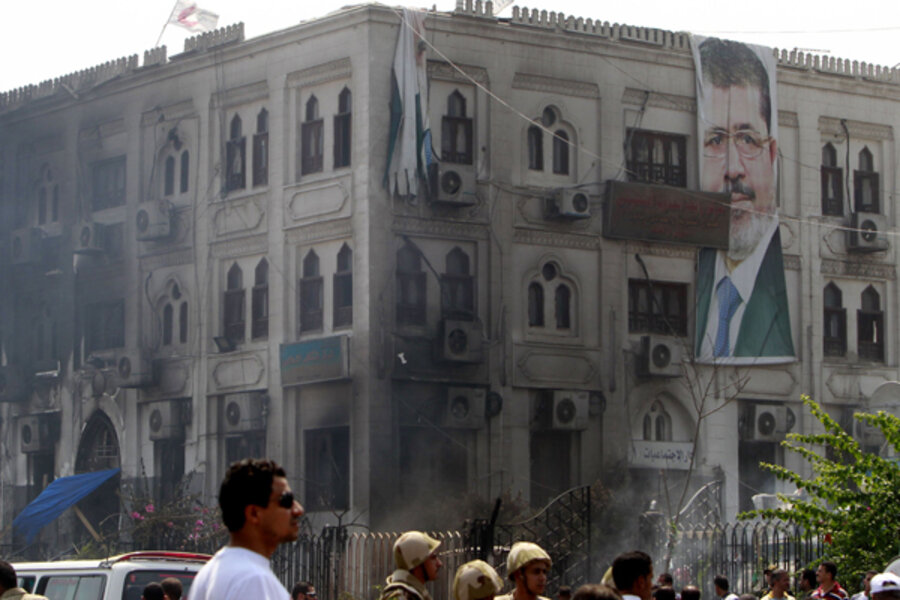Kerry tempers earlier praise of Egypt's military
Loading...
On July 3, Egypt's military carried out a coup, albeit one that was applauded by millions of Egyptians. With the democratically elected Mohamed Morsi of the Muslim Brotherhood ejected from office after less than a year on the job, the probability of a more violent and chaotic Egypt jumped exponentially that day.
And that is what unfolded, coming to a head yesterday. Yet for most of the past month and a half the Obama administration, led by Secretary John Kerry's State Department, tied itself into knots to avoid calling the military takeover a coup. It insisted that Army chief Gen. Abdel Fatah al-Sisi's appointment of technocrats and former officials of the Hosni Mubarak dictatorship were evidence of civilian control.
Consider what Mr. Kerry told Hamid Mir of Pakistan's GeoTV on a visit to that country way back on Aug. 1.
"The military was asked to intervene by millions and millions of people, all of whom were afraid of a descendance into chaos, into violence. And the military did not take over, to the best of our judgment so – so far. To run the country, there’s a civilian government. In effect, they were restoring democracy."
At this point Mir interjects: "By killing people on the roads?" Kerry responds:
"Oh, no. That’s not restoring democracy, and we’re very, very concerned about, very concerned about that. And I’ve had direct conversations with President Mansour, with Vice President ElBaradei, with Gen. al-Sisi, as have other members of our government. And I’ve talked to the Foreign Minister Nabil Fahmy, so I’ve been in touch with all of the players there. And we have made it clear that that is absolutely unacceptable, it cannot happen."
Yet it just did, in far greater numbers than on July 3. Egypt is closer to, not farther from, chaos after the past month, and further from a democracy than at any point since the day before Mr. Mubarak was toppled in February 2011. With 525 people killed in the past two days and more than 3,500 wounded after security forces broke up pro-Muslim Brotherhood protests and Brotherhood supporters staged reprisal attacks, people are wondering if the military is going to try to engineer a return to the status quo that prevailed before Mubarak was removed from power in February 2011.
Steven Cook, a senior fellow for Middle Eastern Studies at the Council on Foreign Relations and the author of "The Struggle for Egypt: From Nasser to Tahrir Square," wonders if the military was ever interested in letting go. He writes in Foreign Policy this morning:
Egypt is as far away from the revolutionary promise of Tahrir Square as it was in November 2010 when Mubarak staged perhaps the most fraudulent parliamentary election since they began in the late 1970s.
Today the "revolution" that really never was, is over. Egyptians will go to sleep tonight under a curfew and wake tomorrow under the hated Emergency Law that places the country under military rule. The government claims the measure is temporary – only for a month – but given Egypt's current circumstances that is not likely to be the case. Supporters of ousted president Mohamed Morsy have stepped up their mindless campaign against Egyptian (Coptic Christians) and the violent repression of the opposition sit-ins will likely lead to even more radicalization. How long before the Muslim Brotherhood seeks redress through the force of arms? Spokesmen for the interim government argue that they have extended a hand to the Brothers to join the transition, but that they rejected it. Of course they did.
Kerry appears to be belatedly shifting his tone on what's happening in Egypt, while perhaps still misunderstanding the Egyptian military's intentions. In a statement last night, he said:
Violence is simply not a solution in Egypt or anywhere else. Violence will not create a roadmap for Egypt’s future. Violence only impedes the transition to an inclusive civilian government, a government chosen in free and fair elections that governs democratically, consistent with the goals of the Egyptian revolution. And violence and continued political polarization will only further tear the Egyptian economy apart and prevent it from growing and providing the jobs and the future that the people of Egypt want so badly.
... The only sustainable path for either side is one towards a political solution. I am convinced from my conversations today with a number of foreign ministers, including the Foreign Minister of Egypt, I am convinced that that path is, in fact, still open and it is possible, though it has been made much, much harder, much more complicated, by the events of today.
Does the Egyptian military really want to allow a "transition to an inclusive civilian government?" With the crackdown of the past two days, arrests of more senior Muslim Brotherhood members, and what appears to be an intent to wipe Egypt's Islamist politicians from the scene, we have good reasons to doubt that.






